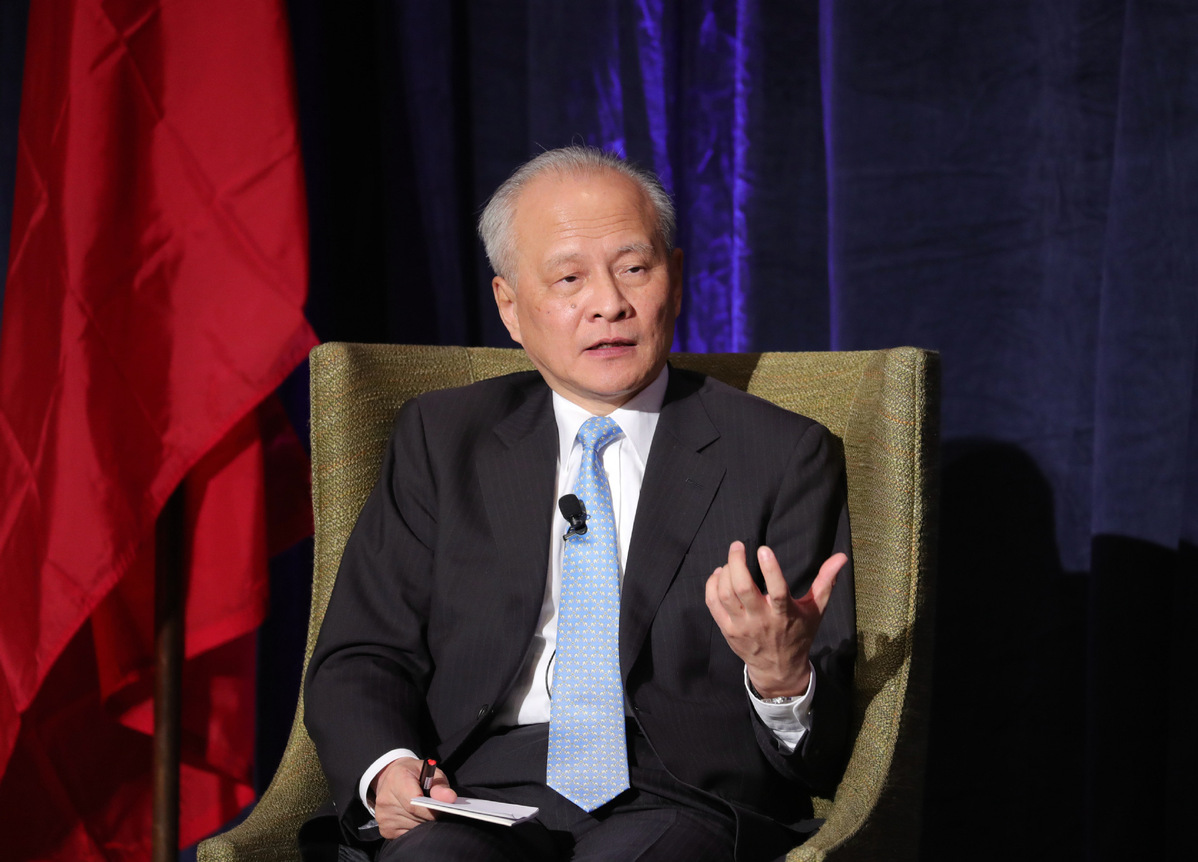Human rights protected 'at every level'


Top Chinese envoy defends democratic efforts in Xinjiang from the 'ill-informed'
What the Chinese government is doing in its Xinjiang Uygur autonomous region, including efforts to root out terrorism by launching vocational education facilities, is actually protecting human rights, Chinese ambassador to the United States Cui Tiankai said on Tuesday.
In an opinion piece published in The Washington Times, Cui categorically refuted the claim of "some ill-informed or even ill-intentioned people" who hyped up the "Xinjiang issue" as a so-called stain on China's human rights record.
Cui said it is "not an issue about human rights or religion at all". He said that since the 1990s, Xinjiang has been a victim of the same rampant terrorism and religious extremism that has plagued the whole world.
"We have endured thousands of violent terrorist attacks," Cui said in the commentary, "China's quest for human rights and democracy".
To bring the situation under control, the government has taken a comprehensive approach, focusing on preventive measures, including establishing vocational education and training centers, to help the "misdemeanants misguided by extremism" to learn the country's common language and law, and acquire employable skills, he wrote.
"These measures have worked-there have been no violent terrorist attacks in Xinjiang for 28 months," Cui wrote. "What we are doing is protecting human rights at every level."
Cui went on to say that Xinjiang has 24,400 mosques, or one mosque for every 530 Muslims, a higher rate than most Muslim countries.
The ambassador's comments were made a day after the US Department of State issued a statement by its Secretary Mike Pompeo, who China's Foreign Ministry said "made vicious accusations on China's political system, human rights and religious conditions, and baselessly criticized China's Xinjiang policy".
"To many Westerners, the concept of human rights in China is a negative one," Cui began his article with this statement.
He added that China's critics are in fact facing a paradox: How could a country with one-fifth of the world's population but no human rights to speak of have made such enormous strides in its economic and social development?
Looking back at Chinese history, Cui said that for starving, downtrodden people in a war-torn country, "human rights" were a luxury.
"Seventy years ago, when the People's Republic of China was founded, the average life expectancy in China was only 35. In such dire times, ensuring the survival of its people was China's imperative, and this guided policy for the past 70 years," he wrote. "Without assuring the right to survival and development, other rights are castles in the air."
Last year, China's life expectancy reached 77, higher than the world average of 72. The country has also lifted more than 740 million people out of poverty over the past four decades, accounting for over 70 percent of the world's total population lifted from poverty, Cui wrote.
In addition, China has put in place the world's largest networks of education, social security, medical care, and community-level democracy, he added.
The ambassador also said the assumption that China is not a democracy reflects "a large misunderstanding".
For decades, China has been committed to upholding the Communist Party's leadership, ensuring that the people run the country and practice law-based governance, he said in the article.
"Indeed, it is those countries who masquerade as democracies but flout the will of the people who should think about the condition of their democracy," he said in the op-ed piece.
Cui concluded his article by quoting a Chinese saying, that "only the wearer knows if his shoes fit or not", and added that the protection of human rights is a never-ending process, and China will always strive to do better.

































